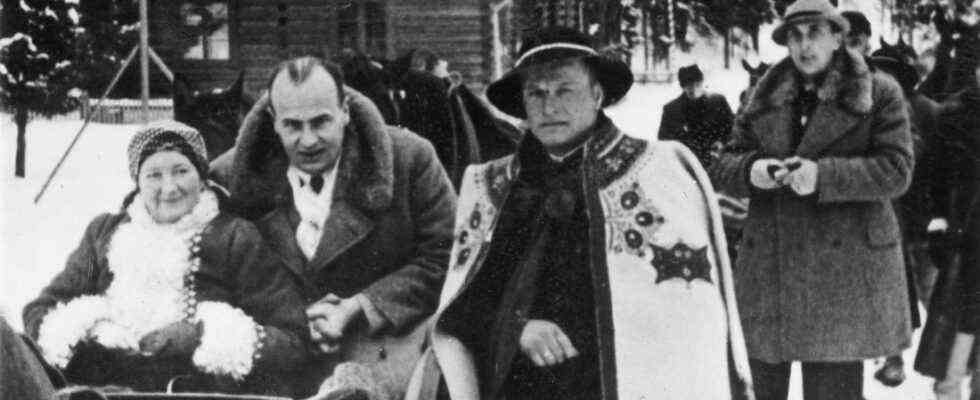Perhaps one should start the story where it ends, in the gym of the Nuremberg cell prison. In the early morning hours of October 16, 1946, the death sentences of the major war criminals were carried out there. One of them was Hans Frank, Hitler’s lawyer and governor general in occupied Poland. While he was ruling from the Wawel in Krakow, millions of people were gassed in the extermination camps, shot in the ghettos, and hung on telegraph poles. Jewish children were grabbed by the feet by the Nazis and their heads hit the wall until they stopped moving. When Hans Frank entered the gym, in which three gallows were set up, he is said to have smiled.
Decades later, in the distant year 1987, Frank’s youngest son, the then one, wrote star-Journalist Niklas Frank, a book about the father. In it this sentence: “The cracking of your neck saved me a messed up life.” And then an angry reckoning with the father and his crimes – at a time when the Germans were primarily concerned with keeping silent about the terror of the National Socialists.
The son calls the father “lying mouth”
Ultimately, Niklas Frank always updated his accounts. In books about his mother, brother, or the AfD’s hate-drenched rhetoric, which reminds him of his father’s speeches. This year he has now published the letters that Hans Frank and his family sent each other during the Nuremberg Trial. “My Family and Their Executioners” undisguised shows how one of the central organizers of the Holocaust deals with the question of guilt and responsibility. And just like in the family immediately after the war, something that will soon affect the whole country: the great displacement.
As early as October 1945, when the trial had not even started, Hans Frank was baptized in prison. Afterwards he coddled his way through the months of trial, reading the Bible and happily in such a way that everyone could see him doing it. A few years earlier, in December 1940, Hans Frank had said in front of the First Guard Battalion in Cracow that he had “of course not been able to get rid of all the lice and all of the Jews in one year”, but that “could be done”. In his letters to his children, he was raging about the good Lord or wrote in his cell on All Saints’ Day that “the mourning bells lament gloomy”.
Niklas Frank, his son, worked through all of the letters again, counted the word “God” alone 550 times, and today asks himself “in his poetic outpourings: Is the lying mouth real?” He repeatedly arranges the letters from his father and mother, his four siblings and his own, comments on them and does not even try to hide his anger. For example, when he describes how film recordings from the concentration camps were shown to the accused. How the guard had to get his father from his seat because he continued to stare in front of him, tears in his eyes: “If it wasn’t a disgusting self-presentation.”
As a student, Niklas often painted hanged people
When the trial began, Niklas Frank was six years old, lived with his mother and siblings at Schliersee, and later at the boarding school in Wyk auf Föhr. A quiet, observant child who was best placed to go mad over his father’s guilt. Between his hypocritical letters, the sometimes desperate, sometimes frosty replies from his mother and the childlike lines of his brother Michel (who “spellingly preferred the period of the 16th century, when the rules of spelling had not yet enslaved free German”), between all of this so Niklas Frank keeps illuminating what his family history has done to him.
Once he shot the boy’s hedgehog with an air rifle. Later he and his brother set fire to anthills and listened to “the faint crackling ants make when they catch fire”. As a teenager, his father was long dead, he sat in art class at the boarding school on Föhr and painted quietly. Fields full of gallows. A hanged man trying to loosen the rope. Everything with a lot of blood.
And once, shortly after the war, Niklas Frank opened an American newspaper as a boy. A photo from a concentration camp was printed there; he saw the mountains of corpses for the first time. Underneath it said that the concentration camp was in occupied Poland. And the boy knew: Poland is where his father was.
Niklas Frank: My family and their executioner. The Butcher of Poland, his Nuremberg Trial and the trauma of displacement. JHW Dietz Nachf. Verlag, Bonn 2021. 288 pages, 24 euros.
Niklas Frank shows how the family opposed the verdict in their letters. The evidence is so overwhelming how Hans Frank and his wife hide all guilt, sometimes encourage themselves, sometimes poison, and yet know exactly that death awaits their father.
In the end there is the bitter diagnosis that Niklas Frank keeps making his family and the Germans: that they never honestly recognized the crimes of the Nazis. Between the letters it flashes again and again that he probably didn’t go crazy because the boy didn’t let his father take away his laughter.

